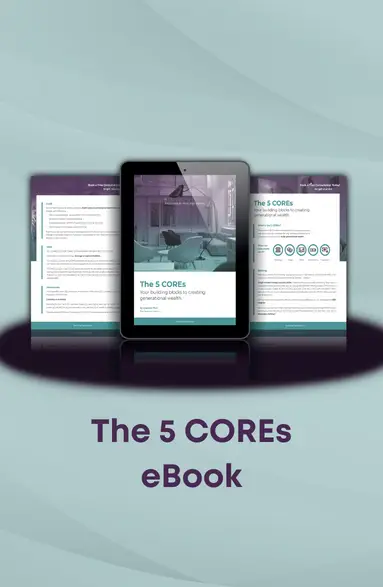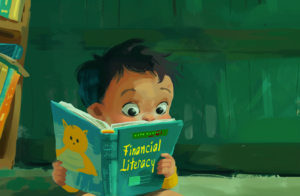In today’s whirlwind of financial advice and wealth-building strategies, it’s easy to feel like an outsider looking in. Perhaps you’ve uttered the words yourself or heard them in passing – “I’m just not good with money. It’s not my thing.”
This single sentence is loaded with defeat and resignation, a limiting belief that can hold you back from achieving your financial goals.
But where does this notion come from, and more importantly, how can we challenge it to rewrite our financial narratives?
The Root of Financial Self-Doubt
Who Told You This Lie?
The journey toward financial literacy often begins with confronting a harsh reality – somewhere along the line, either we’ve convinced ourselves or someone has convinced us that we’re inherently bad with money.
This myth, while deeply ingrained, is just that: a myth. It’s critical to question the basis of this belief. Who shat on you and gave you, fed you this lie?
Identifying the source can be enlightening, revealing that this limiting belief might stem from past experiences, societal norms, or even comments from those close to us.
Evidence vs. Emotion
When faced with self-doubt about our financial capabilities, it’s essential to distinguish between hard evidence and emotional baggage.
Ask yourself, what evidence do you have to support this notion that you’re not good with money? Often, you’ll find that your belief isn’t grounded in facts but rather in emotions or past setbacks.
More importantly, it’s crucial to understand that your current financial situation is not a life sentence but a temporary state that can be changed with knowledge, effort, and perseverance.
Transforming Your Financial Mindset
The Journey from Scarcity to Abundance
Transforming one’s financial mindset from scarcity to abundance is no small feat, especially for those of us who grew up with a “poor money wealth mindset mentality.”
This mentality is characterized by a constant state of scarcity, where every expense feels like a drain on an already depleted resource. The path to overcoming this mindset involves recognizing that our past does not have to dictate our future.
My own journey involved over a decade of effort to solidify the fundamentals of our family’s wealth and financial structure. This process taught me a crucial lesson: don’t base your own financial future off of your current circumstances.
The Power of Growth and Adaptation
A powerful quote to remember in times of self-doubt is, “You won’t get to where you want to be by being who you are today.” This statement echoes the necessity for personal growth and adaptation.
The version of yourself that exists today might not be equipped to meet your financial goals, but that doesn’t mean you can’t evolve. You are not a physical rock – you have legs.
Growth is a constant process, requiring us to shed limiting beliefs and embrace new knowledge and habits.
Embracing the Learning Curve
Financial literacy is a journey that requires patience and a willingness to learn. For those without a strong financial background or support network, the path might seem daunting.
However, it’s important to remember that everyone’s journey is unique, and comparisons only serve to distract and dishearten.
Embrace your personal financial learning curve, acknowledging that while the journey may be long, every step forward is a step toward financial empowerment.
Navigating the Money Game: From Failure to Wealth Creation
The Willingness to Fail
A critical aspect of overcoming the belief “I’m just not good with money” is cultivating a willingness to fail. The money game is a long and complex one, and missteps are part of the learning process.
Distinguishing between getting rich quickly and creating sustainable, generational wealth is crucial.
The latter requires patience, discipline, and a readiness to learn from failures without allowing them to define your financial journey.
Mastering Emotional Management
Achieving financial literacy and success is not just about mastering numbers and investment strategies; it involves mastering emotional management.
Understanding your emotional triggers and learning how to manage financial stress are essential skills in the journey toward financial wellness.
These skills don’t develop overnight but through consistent practice and reflection.
Starting Where You Are
For many, the starting point in their financial literacy journey involves an overwhelming consumption of information. However, this approach is often counterproductive.
Instead of trying to learn everything at once, start by building your financial vocabulary and focusing on a few topics that genuinely interest you.
Create a personalized learning plan that allows you to explore financial concepts at your own pace, gradually building your confidence and knowledge.
The Path to Financial Literacy for the 99 Percent
You Are Not Alone
For those just beginning their journey to financial literacy, the path can sometimes feel lonely and insurmountable.
However, it’s important to remember that you are not alone. There are resources and communities available to support you every step of the way.
As a financial literacy coach, I specialize in guiding families through the complexities of the financial world, providing the necessary tools and support to navigate this challenging landscape and to master it.
Reaching Out for Support
If you’re feeling overwhelmed or uncertain about where to start, reach out for support. Financial literacy is not reserved for the elite 1 percent; it’s for everyone.
Whether you’re a complete beginner or someone looking to deepen your financial knowledge, there is a place for you in this journey.
Together, we can challenge limiting beliefs, build financial confidence, and create a brighter, more financially secure future.
Overcoming Financial Self-Doubt
Confronting and overcoming the belief “I’m just not good with money” is a critical first step on the path to financial literacy and empowerment.
By questioning the origin of this limiting belief, embracing a mindset of growth and learning, and navigating the complexities of the money game with patience and resilience, we can transform our financial narratives.
Remember, your financial journey is unique to you, and with the right support and dedication, you can achieve your financial goals. Let’s take that next step together, breaking free from the chains of financial self-doubt.






